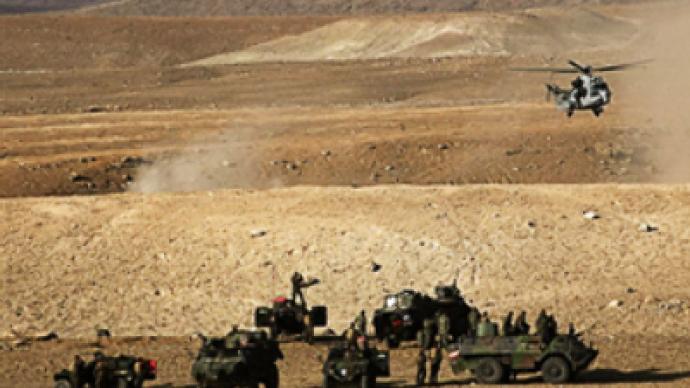Thursday’s press review

Thursday’s newspapers in Russia attempt to predict Barack Obama’s future Russia policy and the political feasibility of greater Russian participation in the U.S. led international effort in Afghanistan.
NEZAVISIMAYA GAZETA publishes an analytical article on the inaugural speech of Barack Obama. It says that the absence of the word ‘Russia’ in the speech wouldn’t have been alarming in any way, if there wasn’t reference to ‘former enemies.’ That, says the paper, may be a pointer to ideology making a come back in Russia – U.S. relations, with Obama also appointing a few ‘old timers’ with cold-war attitudes to senior positions.
The article also notes that the speech had the usual undertone, of America’s superiority over the rest of the world and its role of ‘world leader’, which will continue playing during Obama’s presidency. But the paper also adds that the speech clearly shows the new U.S. leadership is ready to get rid of the most notorious notions and policies borne by the previous administration.
ROSSIYSKAYA GAZETA publishes an interview with Dr. A. Utkin from the Institute of the U.S.A. and Canada, at the Russian Academy of Sciences, who attempts to predict the main foreign policy directions of the Obama administration based on the latest U.S. National Intelligence Estimate – an annual document which, as he says, this year is free of neo-conservative influence and was created with the new administration in mind.
The academic says that the document makes a few statements which suggest a revolution in U.S. political thinking: First of all it states that the world now has a multitude of centres of power, and that the attempt at world domination by the U.S. has irrevocably failed. The document also notes the sharp decrease in the role of international institutions created after WW II: from the World Bank to the UN. As a whole the document sees the multi-polar world of today as less stable than bi-polar or uni-polar versions.
Utkin says that the document indicates, for the first time, that the world can continue its development path without the leadership of the West, which, in terms of its share of global population, will shrink to 10% by the year 2025, while China, India and Japan continue growing – economically, and in terms of population and political clout. The document attributes the massive capital shift towards the East, initiated by the dominance of market philosophies and laws in the West, and causing irreversible global change, to the proportional changes in global political influence.
Utkin notes that the above, means the U.S. needs to undertake immediate steps to boost its image, which was badly damaged by the Bush administration’s actions, and that all policies need to be re-thought and adjusted to reflect new realities. He says that this amounts to nothing less than an American ‘Perestroika’.
KOMMERSANT writes that the insistent references, by top U.S. military commanders and senior civilian officials, to alternative armament supply routes for NATO forces in Afghanistan, may be a signal that the U.S. is ready to offer Russia an important role in its highest priority geopolitical project, probably in exchange for downgrading plans for deployment of U.S. missile defence elements in Eastern Europe.
The paper adds that the leaking of a secret letter, from President Medvedev, containing a positive response to Afghanistan’s request for military aid, by the executive office of the President of Afghanistan. It suggests that this was orchestrated by the U.S. to signal to Moscow that Washington would like it to become more actively involved in the Afghanistan mission, with the supply route through Pakistan becoming increasingly problematic.
So far, says the paper, the Russian part of the alternative route is cleared for non-weapon supplies only. The U.S. probably wants to upgrade it, together with several more alternative routes going through the post-Soviet states of Central Asia.
An analytical article by Andrey Fedorov, the former Deputy Foreign Minister of Russia and current academic, published in the same issue of Kommersant, addresses the impact of the U.S. Afghanistan operation on Russia’s national interest in the Central Asia. He writes that, under any given circumstances, Russia’s presence in the region isn’t just ceremonial, but real and concrete. This is underpinned by a system of agreements with the countries in the region, and by an extensive network of business relationships. He notes that, as in the East, mere words, even written words, are sometimes not enough, ‘while big money can cause a change in the existing friendships.’
VREMYA NOVOSTEI addresses on the same issue, but says that in its opinion the leaking of President Medvedev’s letter is an attempt by the government of Afghanistan to threaten Washington and Brussels with the prospect of closer ties with Moscow if they continue ignoring and dismissing the Afghan government as ineffective. In the paper’s view it is more probable than the idea of the U.S. delivering its messages through the government of Afghanistan.
The paper says that the alternative supply routes, that America is currently setting up, go mostly through the ex-Soviet republics like Azerbaijan, Georgia, who have already given their consent to the plans, and Kazakhstan and Kyrgyzstan which are still in two minds about them.
Russia’s role in these plans is so far insignificant, continues the paper, Russia will become important for the U.S. here only if or when the Central Asian republics firmly reject the plans. But, says the paper, this is improbable, and that it is more likely that the situation will develop further along the old lines, and totally contrary to Russia’s national interest.
Evgeny Belenkiy, RT













